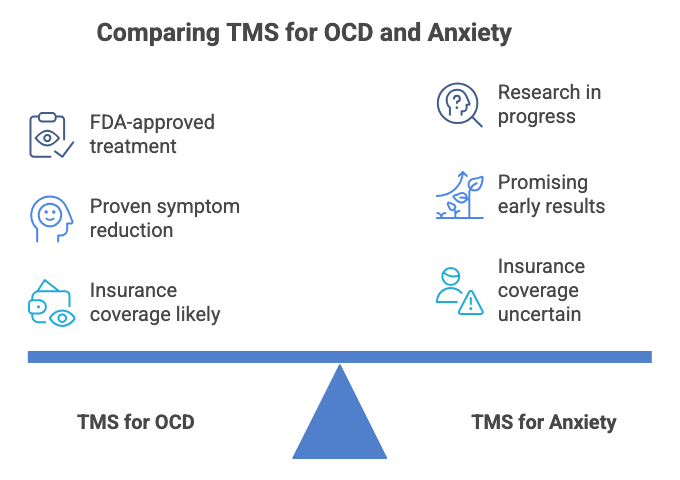Can TMS Help With OCD or Anxiety?
You may have heard about Transcranial Magnetic Stimulation (TMS) being used to treat depression, but what about its effectiveness in treating OCD or anxiety?
For people living with these conditions, especially when medication or therapy hasn’t worked, TMS may offer another option. Although it may not be right for everyone, it’s important to understand your options and hear how TMS has helped improve the lives of those with OCD and anxiety.
What is TMS
TMS is a non-invasive treatment that uses magnetic pulses to target specific areas of the brain associated with mood regulation.
It is performed in a clinic, typically five days a week, over four to six weeks. Each session lasts around 20-30 minutes, and you are awake the whole time. There is no recovery time needed, so most people can drive home directly after treatment. Side effects are usually very mild and short-term. For example, you may experience slight scalp discomfort or a mild headache after treatment.
TMS is primarily used to treat depression, usually for those who have not had relief with medication or therapy. However, research is expanding to look at what else TMS might be able to treat, such as OCD and anxiety.
TMS for OCD
In 2018, the FDA cleared deep TMS for treating obsessive-compulsive disorder (OCD), after research showed it helped to reduce symptoms for those who didn’t respond well to standard treatments. One study found that after six weeks of treatment, deep TMS helped a significant number of patients, with some reporting experiencing lower amounts of intrusive thoughts.
OCD has been linked to specific circuits in the brain, which are involved in decision-making. TMS works by stimulating these areas, thus helping reduce the intensity of obsessive thoughts and urges. Many people have shown an increased ability to resist compulsions that before were almost impossible to ignore.
TMS for Anxiety
TMS has not yet been FDA-approved to treat anxiety by itself. Although early studies have shown promising results, further research is needed to understand the effectiveness of TMS on anxiety before it becomes a standalone treatment to help patients.
With anxiety, the brain can be overactive in areas associated with emotional regulation. TMS may be able to reset these patterns. Many patients that use TMS to treat their depression, but also experience anxiety, have reported that TMS actually improves both.
While research on anxiety is still developing, these early outcomes are encouraging. With that said, many clinics may not offer TMS as a treatment for anxiety alone quite yet, and insurance may not cover it. TMS is not a proven cure for anxiety, but it may offer support when other options have not worked.

Who Might Benefit
TMS may be the right treatment for you if:
- You have tried therapy or medication without much improvement
- You can’t tolerate the side effects of antidepressants or anti-anxiety medication
- You want a non-drug option
- You are willing to attend regular sessions for several weeks
TMS may not be suited for everyone. You will need to be evaluated to see if TMS is a good fit for you, especially if you have a history of seizures or have metal implants in or near the head.
What to Do Next
If you think that TMS might help you or someone you know, start by talking to a doctor or mental health provider. You can also use MDDCare to explore treatment options and find clinics near you that offer TMS.
Everyone’s experience with OCD or anxiety is different, and what works for one person may not work for another. But for some, it can bring real relief. If talk therapy or medication has not worked for you, now may be the time to explore a different path. Visit MDDCare.com to learn more and find a TMS clinic near you.
